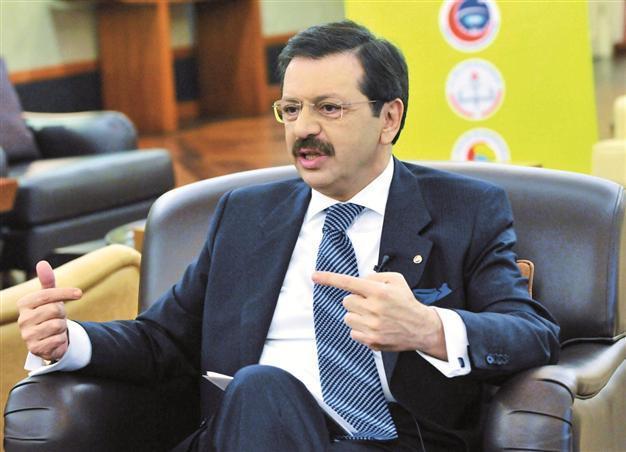Women’s exclusion from SMEs hampers institutionalization: Top Turkish business representative
Sadi Özdemir ANKARA

Turkish Union of Chambers and Commodity Exchanges (TOBB) Chairman Hisarcıklıoğlu said family businesses should adopt measures for institutionalization.
Small and medium-sized enterprises (SMEs) in Turkey face “institutionalization struggles” because of family disputes, and particularly because favoring male children hampers their longevity, according to the country’s top business representative.SMEs constitute a substantial section of most national economies, and most of them are established as family businesses, with roots in one person and their close circle, mostly their family, said Rifat Hisarcıklıoğlu, the chairman of the Turkish Union of Chambers and Commodity Exchanges (TOBB).
“Family businesses are, of course, the backbone of economies. Three quarters of companies in the world are still family companies. However, barely 30 percent of family businesses are able to be transferred to a second generation, while only 12 percent of them make it to a third generation,” Hisarcıklıoğlu added.
The ratio is even lower for Turkey, as only 10 percent of Turkish SMEs are transferred to a third generation, revealing the extent of sustainability problems.
Despite family ties facilitating the establishment of trust between entrepreneurs in the early stages, problems begin to spring up as the company and family expand and the energy spent on developing the business begins to be spent on inter-family clashes, usually ending up in break-up or bankruptcy.
“There are many 200-year-old family firms that transform themselves by becoming institutionalized and growing from generation to generation. However, in our country, the largest companies die out because they can’t become institutionalized. Our companies generally give up on institutionalization,” Hisarcıklıoğlu stated.
“We are an entrepreneurial country that starts up scores of companies every year,” he added, expressing his regret over the general failure to sustain these start-ups.
Exploring the reasons for this recurring problem, Hisarcıklıoğlu suggested that discrimination against daughters in favor of sons was the biggest obstacle in front of the institutionalization of SMEs in Turkey.
“First of all, we cannot get institutionalized without solving the deed problem. Are you thinking, ‘what’s the connection?’ Let me tell you. When you look at land registry records, nearly 90 percent of deeds are registered to men. Company and factory deeds are registered to males as well,” he said.
“When you exclude your daughters over fears of the son-in-law, and instead build your company only through male children, enterprises don’t reach the second generation, because you leave an unjust legacy. When your sons can’t get along, the enterprise established against many challenges goes to waste,” Hisarcıklıoğlu added.
He said entrepreneurship was a woman’s right just as much as it was a man’s right.
Another problem for Turkish SMEs is that entrepreneurs are usually unaware of the difference between being a capital owner and being a manager, according to Hisarcıklıoğlu.
“Being the boss and having the capital doesn’t make anyone a good manager. We need to understand this,” he said, stressing that the only way for companies to stay on their feet in today’s conditions was for them to be managed by people equipped with the required skills.
“Worldwide studies prove that companies run by professionals are better managed than family businesses,” Hisarcıklıoğlu said.
















